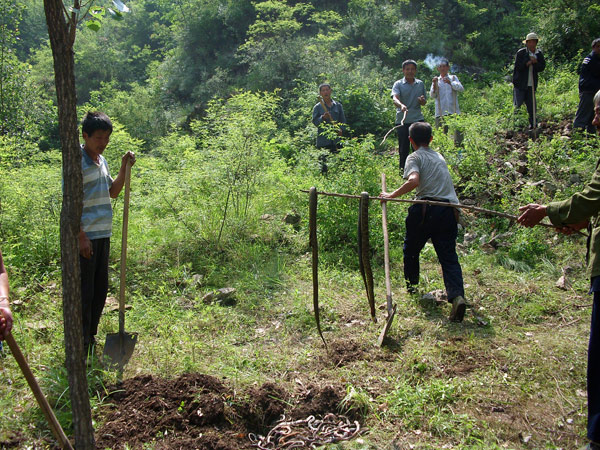Freeing captured animals, an act often carried out by Buddhists or animal lovers, could lead to ecological disasters such as an imbalanced food chain, an invasion of foreign species or the spread of contagious diseases, according to experts.
The warning came after a group of people set thousands of snakes free near Miaoerdong village of Xinglong county in Hebei province, on June 1.
The incident aroused panic among residents over their safety and risks to their farmland. It resulted in the snakes being driven away or killed over several days.
 |
|
Local residents prepare to bury dead snakes in Miaoerdong village in Xinglong county, Hebei province, on June 3. A group of people set thousands of snakes free near the village on June 1, arousing panic among villagers. Zhang Jian / for China Daily |
According to Xinglong county forestry public security bureau, the people who released the snakes are believed to be animal lovers who organized the activity online and bought the reptiles from a pet market in Beijing without knowing where the snakes came from or whether they were poisonous or not.
Liu Huili, an animal rights campaigner with Green Beagle, an NGO in Beijing, said that setting snakes free without knowing their species and living environments might lead to their deaths if the geography is not suitable for their survival.
|
 |
In addition, the sheer number of snakes could have resulted in all the frogs being eaten in a very short time, she said. The ecological balance in the village could be destroyed and the snakes would eventually die of hunger.
In another incident, researchers from the South China Institute of Endangered Animals said they found more than 200 Brazilian tortoises on Baiyun Mountain in Guangzhou, Guangdong province, after carrying out a survey between November 2008 and October 2011.
The tortoise is listed among the 100 most dangerous invading species by the International Union for Conservation of Nature and Natural Resources.
Originating in the central United States, the Brazilian tortoise has very strong reproductive and competitive capacities, and can mate with different species and adapt to various kinds of environments.
The amphibians are inexpensive and can be easily found at pet markets, though many people buy them and set them free. Because of that, the institute's research report said, the Brazilian tortoises on Baiyun Mountain might be those released by residents.
Right now wild stocks of Brazilian tortoises are found in the regions of the Yangtze and Pearl rivers, and pose a serious hazard to ecological systems.
Ma Jianzhang, an expert on wildlife protection at Northeast Forestry University, told China Daily that the invading species would cause the change of local species by breeding with them and destroying diversity.
"When setting free a certain kind of animal, one must make sure the species is the same as local varieties," he said.
Also, some foreign species may carry contagious diseases or dangerous parasites. They can spread the new diseases to indigenous animals and affect their reproduction, Ma said.
According to the institute report, Brazilian tortoises carry salmonella, which can lead to food poisoning and typhoid. It can spread the disease to other animals and even humans.
Liu Jingyu, director of the Xinglong forestry public security bureau, said according to China's law on wild animal protection, people who want to set free animals brought from other provinces or countries should get approval from forestry authorities.
If people release exotic animals to the wild without permission, they must catch the animals or make up for the losses caused by their activities, he said.
The group of people setting free the snakes paid 40,000 yuan ($6,300) to the villagers as compensation.
Apart from ecological damage, buying animals from the markets and setting them free has also caused an unhealthy supply chain, according to Liu, as sellers would catch the animals, even hunt them unlawfully, then sell them to people who want to release them.
"Some animals, like wild birds, will die when they are caught or transported. Under these circumstances, animals are being killed because someone wants to set them free," she said.
Liu said animal lovers and religious groups could cooperate with specialized wild animal protection organizations to make up for their deficiency of ecological knowledge and increase the success in saving lives while maintaining the ecological balance.
"We can protect lives and animals by not wearing fur or purchasing cosmetics products tested on animals, not just buying and setting animals free irresponsibly," she said.
Contact the writer at zhiyun@chinadaily.com.cn
